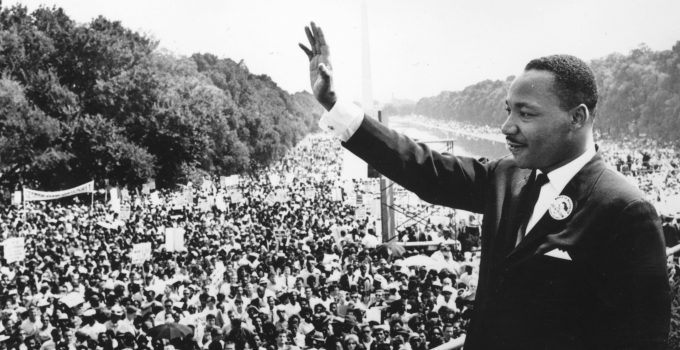Martin Luther King Jr.’s birthday and the history behind making it a national holiday:
The Long Road to Establishing Martin Luther King Jr. Day
The third Monday of every January marks a federal holiday commemorating the birthday of Dr. Martin Luther King Jr., the influential civil rights activist who helped end segregation and racial discrimination in America. But the road to establishing this holiday in King’s honor was long and arduous. It took sustained effort over 15 years for it to finally be signed into law.
King’s Early Life and Education
Martin Luther King Jr. was born on January 15, 1929 in Atlanta, Georgia. He attended segregated public schools growing up and later went to Morehouse College at age 15 without formally graduating high school. At Morehouse, King studied sociology and theology, becoming an ordained Baptist minister in 1947 at age 18.
He then attended Crozer Theological Seminary in Pennsylvania and earned a divinity degree. King later attended graduate school at Boston University, receiving his doctorate in 1955. Throughout his education, King faced discrimination but persevered with a commitment to nonviolent activism.
Montgomery Bus Boycott and Rise to Prominence
In 1955, Rosa Parks refused to give up her seat on a segregated bus in Montgomery, Alabama. This sparked the year-long Montgomery bus boycott, with King as one of the boycott’s leaders. The event helped launch King into national prominence in the civil rights movement.
Over the next decade, King advocated for peaceful resistance and civil disobedience to push for racial equality. He delivered iconic speeches like “I Have a Dream” during the March on Washington in 1963. King’s efforts led to the passage of the Civil Rights Act of 1964 and Voting Rights Act of 1965.
In 1964, at just 35 years old, King became the youngest person ever awarded the Nobel Peace Prize for his civil rights work. This further elevated King’s profile and legacy.
Assassination in Memphis
On April 4, 1968, King was fatally shot while standing on the balcony of the Lorraine Motel in Memphis, Tennessee. He was just 39 years old at the time of his death.
News of King’s shocking assassination sparked protests and riots across the country. Just days later, Representative John Conyers of Michigan introduced the first legislation to establish a federal holiday recognizing King’s birthday.
Initial Failure in Congress
In the early years after King’s death, there was strong momentum to commemorate him with a holiday. Coretta Scott King founded the Martin Luther King Jr. Center for Nonviolent Social Change in Atlanta, which became instrumental in pushing for the holiday.
In 1970, colleges and universities across the country began celebrating King’s January 15th birthday. Then in 1973, Illinois became the first state to establish it as a paid state holiday.
Despite this grassroots support, the holiday proposal stalled in Congress throughout the 1970s. The bill introduced by Rep. Conyers struggled to gain traction. It finally reached the House floor for a vote in 1979 but fell five votes shy of the two-thirds margin needed to pass.
New Push in the 1980s
After the 1979 defeat, organizers regrouped and intensified their efforts throughout the early 1980s. The King Center continued lobbying Congress relentlessly.
In 1981, Stevie Wonder released his hit song “Happy Birthday” to promote the holiday, later performing it at the MLK Memorial dedication. Pop star Michael Jackson also voiced support.
In 1982, petitions with six million signatures were delivered to Congress in support of the holiday. A march in Washington in 1983 drew nearly half a million people urging the holiday’s passage.
Congress Approves the Holiday
With popular momentum building, the House voted again in 1983 and passed the King holiday bill with a margin of 53 votes. It faced a tougher test in the Senate due to the opposition of Senator Jesse Helms of North Carolina, who tried to block it.
But with the strong support of Senator Ted Kennedy, the bill passed the Senate by 12 votes. President Ronald Reagan signed it into law on November 2, 1983. The holiday was first observed in 1986, with Coretta Scott King and Stevie Wonder participating in the inaugural festivities.
State Adoption Follows
In the years after the federal holiday was signed, the remaining states gradually followed by enacting their own holidays honoring King’s birthday. This process lasted into the 1990s.
By 1986, 17 states had established the holiday. But there was resistance in Arizona, which rejected it by popular vote in 1990. It took an NFL boycott and loss of the 1993 Super Bowl for Arizona to finally approve the holiday in 1992. South Carolina was one of the last to make King Day an official paid state holiday in 2000.
The Legacy of MLK Day
Today, Martin Luther King Jr. Day is celebrated across all 50 states to honor King’s life and legacy. It is seen as a day to promote equal rights and reflect upon the social progress that has occurred thanks to King’s efforts and the broader civil rights movement.
For many, MLK Day symbolizes the ability of nonviolent activism to enact positive change. The long, difficult journey to establish this holiday mirrored King’s own struggle to advance civil rights. But with determined effort, both of these fights proved successful in the long run.



